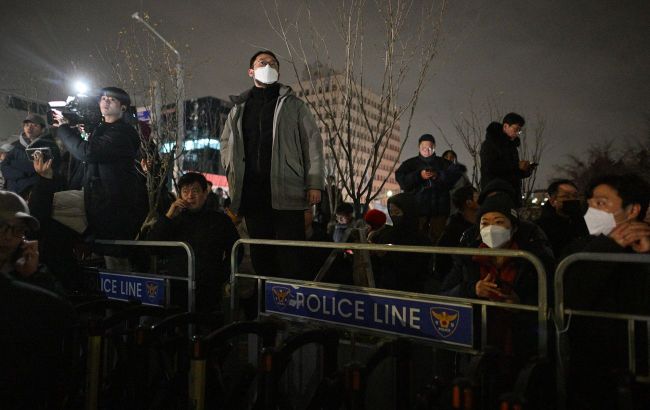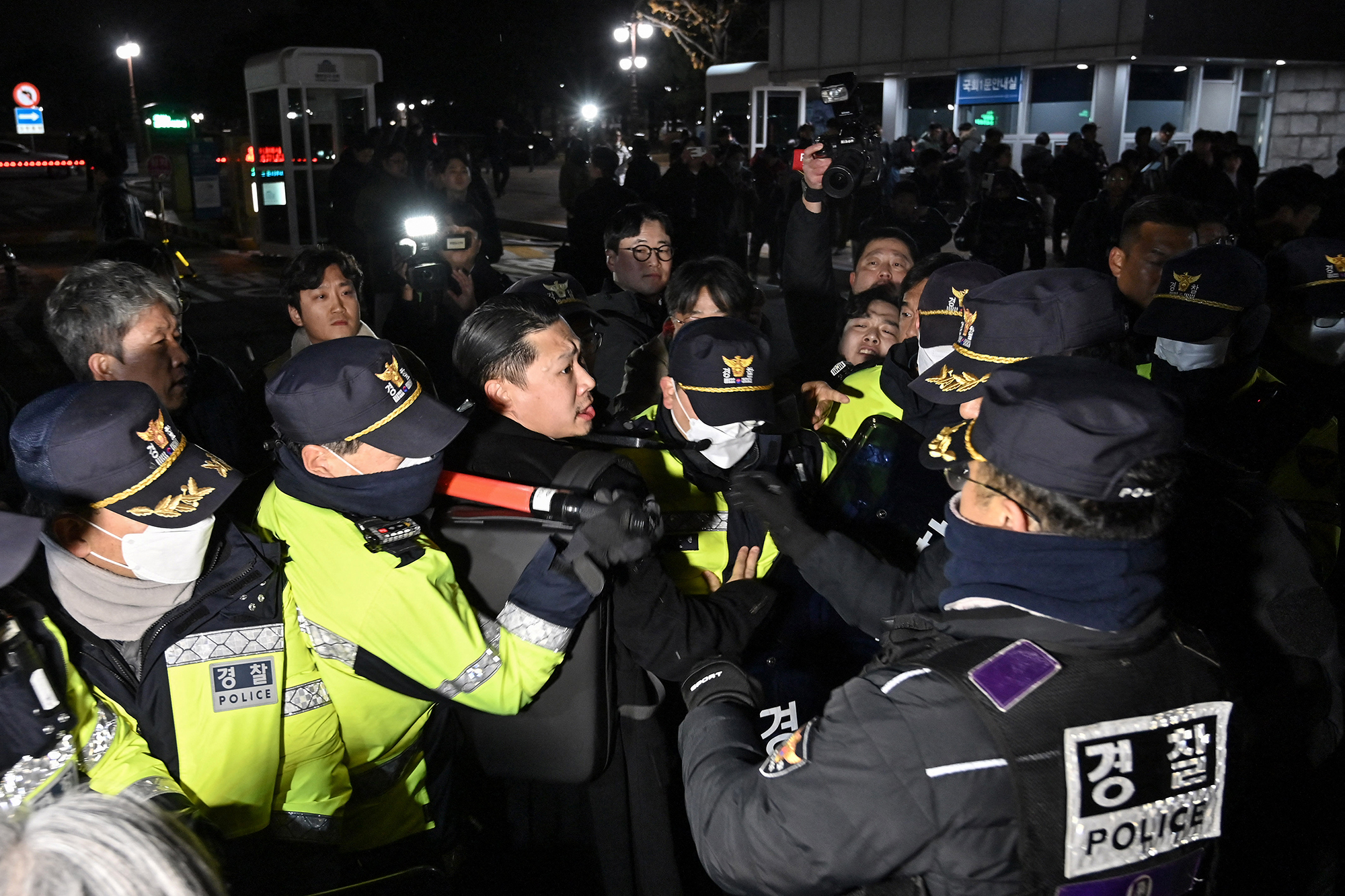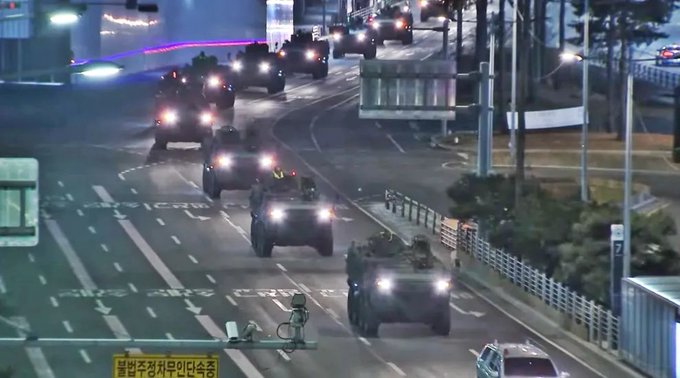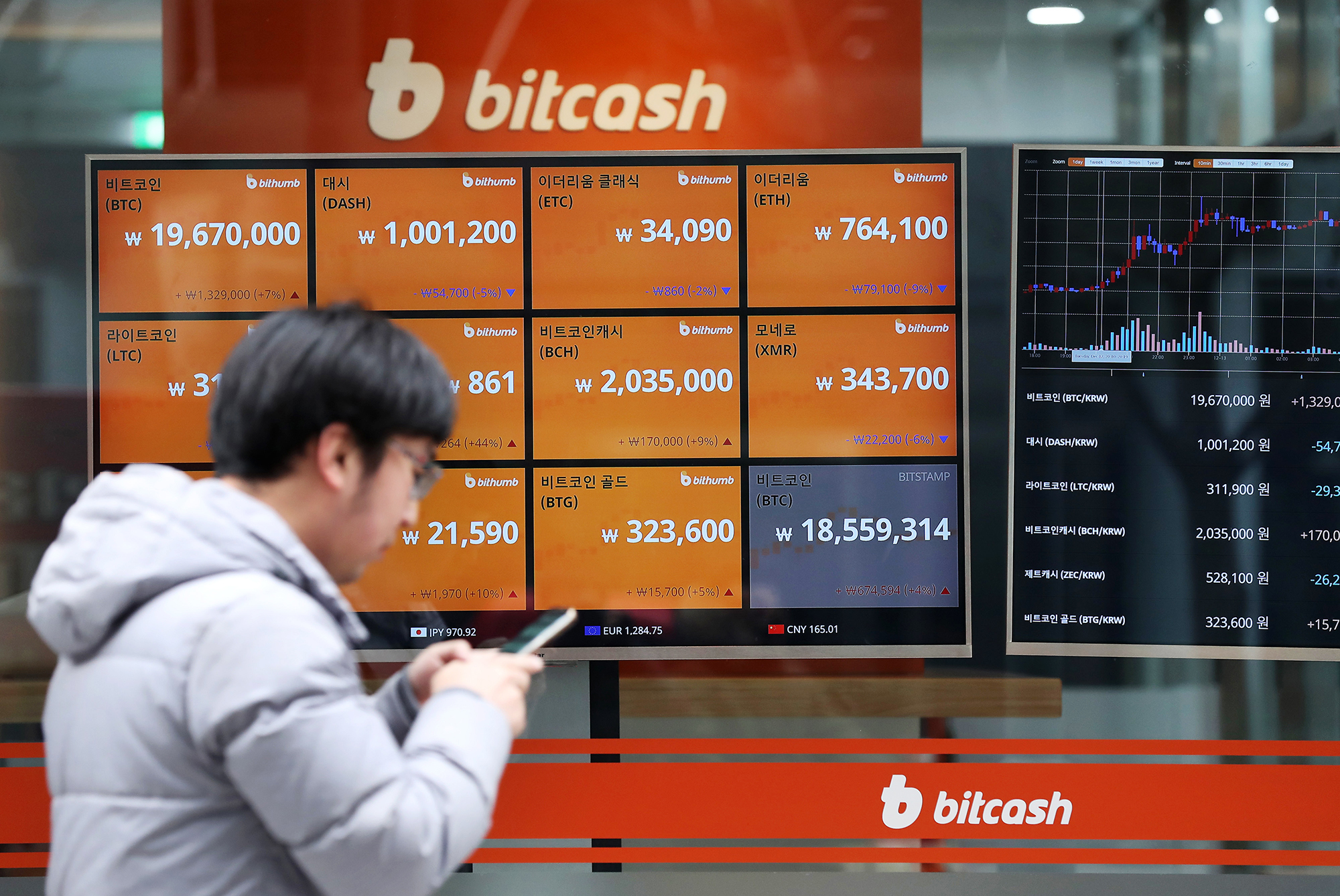Chaos in Seoul. What is happening in South Korea and why martial law imposed
 Photo: Protest near the South Korean Parliament building after the introduction of martial law (Getty Images)
Photo: Protest near the South Korean Parliament building after the introduction of martial law (Getty Images)
South Korean President Yoon Suk-yeol has suddenly declared martial law. Military vehicles appeared on the streets of Seoul, and under his orders, political parties' activities were suspended. Security forces entered the parliament, but the lawmakers managed to pass a resolution demanding that the president revoke the decree.
RBC-Ukraine reports on the situation in South Korea.
Contents
- Martial law in South Korea: What the president said
- Internal context and preconditions for martial law
- Army on the streets and in parliament: What is happening in Seoul
- How financial markets are reacting to martial law
Martial law in South Korea: What the president said
President Yoon announced martial law in an emergency address to the nation. According to him, the move was necessary to "eliminate anti-state elements" and protect the country from the communist forces of North Korea.
He began his address by stating that the National Assembly is seeking the impeachment of several ministers, including those of defense and state security. "This is a situation that is not only unprecedented in any country in the world, but has never been seen since the founding of our country," Yoon said.
He also criticized the budget process, during which proposals to cut spending on key state functions, security support, and efforts to combat drug trafficking could turn South Korea into a "drug paradise."

Photo: South Korean President Yoon Suk-yeol declared martial law (Getty Images)
According to him, the opposition Democratic Party cut the budget for 2025 by nearly $3 billion, removing funding for disaster response, social assistance, gas field development, and delaying military salary increases. He called the lawmakers' behavior "legislative dictatorship."
"This trampling of the constitutional order of the free Republic of Korea and the disruption of legitimate state institutions established by the constitution and laws is an obvious anti-state act that plots insurrection... I declare emergency martial law to defend the free Republic of Korea from the threats of North Korean communist forces and to eradicate the shameless pro-North Korean anti-state forces that are plundering the freedom and happiness of our people and to protect the free constitutional order," Yoon declared.
With martial law, he promised to "normalize the country as quickly as possible." "These measures are necessary; there is no change in our foreign policy stance... Please trust me," the president addressed the nation.
It should be noted that martial law is imposed in situations of military threat or when civilian authorities are unable to function. The legal regime allows for the suspension of normal civil rights. Typically, it is a temporary regime, but it can be extended.
In his address, Yoon referred to Article 77 of the Constitution, which states that martial law can be introduced to meet military needs or maintain public order.
Internal context and preconditions for martial law
Martial law has not been declared by any South Korean president since the country became a democracy in the 1980s. South Korea is a presidential republic. The president has broad powers, appoints the prime minister (with parliamentary approval), and serves as the commander-in-chief of the armed forces.
It is important to note that the current martial law is not related to an immediate military threat from North Korea, but is solely a result of internal events.
Yoon Suk-yeol won the 2022 elections as a candidate of the conservative People Power Party. However, in the 2024 parliamentary elections, his political force suffered a defeat. Currently, his party holds 108 seats out of 300, compared to 170 for the opposition Democratic Party.
Thus, after the convincing victory of the Democrats, Yoon became a so-called "lame duck." He lacks the votes to push through his laws, instead desperately vetoing any bills proposed by the opposition.
Additionally, Yoon has been embroiled in several scandals, the most significant of which involves his wife. She is accused of corruption and influence peddling, and prosecutors are criticized for not conducting a special investigation into her case.
This week, the opposition cut the budgets proposed by the government and the ruling party. The problem is that a veto cannot be imposed on the budget bill. This week, the opposition is also set to announce the impeachment of cabinet members.
Army on the streets and in parliament: What is happening in Seoul
After the declaration of martial law, the Democratic Party called for all of its members to urgently gather at the National Assembly. Its leader, Lee Jae-myung, called Yoon's actions unconstitutional and illegal.
Interestingly, the leader of the pro-presidential People Power Party, Han Dong-hoon, also criticized Yoon's decision, calling it wrong. He promised to stop the implementation of martial law "together with the people."

Photo: Opposition supporters outside the South Korean parliament building (Getty Images)
It is reported that a meeting of the military commanders took place at the Ministry of Defense. The ministry also issued instructions to strengthen the emergency readiness of the police and the military.
South Korean Army Chief of Staff General Park An-su, appointed as the commander of martial law, announced the suspension of the parliament's and political parties' operations.
"All political activities, including the activities of the National Assembly, local councils, and political parties, political associations, rallies and demonstrations, are prohibited," he stated.
In addition to the National Assembly's work, any actions that challenge the liberal-democratic system, as well as fake news and false propaganda, will be banned. "All media and publications are subject to the control of the Martial Law Command," Park emphasized.
BREAKING:
— Visegrád 24 (@visegrad24) December 3, 2024
South Korea introduces emergency Martial Law.
Riot police has been deployed in front of Parliament, stopping Members of Parliament from entering the building. pic.twitter.com/nMnDYrYaKF
Violators face the threat of arrest, searches, and detention without a warrant. According to the decree, the military will aim to minimize inconveniences for ordinary citizens, except for those forces "planning to change the government." The Ministry of Defense has also ordered reserve military personnel to be ready to report for duty.
Photos and videos of military equipment on the streets of Seoul are circulating online. Combat helicopters are flying over the streets of the South Korean capital. According to eyewitnesses, several convoys of military vehicles were heading toward the parliament.

Photo: Military equipment on the streets of Seoul (x.com/ashoswai)
It is reported that protesters, along with opposition lawmakers, attempted to enter the National Assembly building. They were prevented from doing so by security forces carrying out the president's orders.
How financial markets are reacting to martial law
In light of the news from Seoul, the exchange rate of the USD/KRW pair increased by 2%. According to trading data, the South Korean currency fell to 1435 KRW per dollar.
Shares of the largest manufacturer, Samsung Electronics, dropped by 7.21% on the London Stock Exchange, reaching $888.50. The Korea Stock Exchange is closed as it is around midnight in South Korea.
The exchange rate of Bitcoin against the Korean won dropped by 30%. It is worth noting that the Korean won is the third most popular currency in which Bitcoin is traded, after the US dollar and the USDT stablecoin. This year, the won has frequently surpassed the dollar in trading volume on cryptocurrency exchanges. Additionally, Bitcoin hit a local low against the US dollar, dropping to $93,600 per coin for the first time in a week.

Photo: South Korean exchanges react to cryptocurrency crash (Getty Images)
However, around 80% of trading volumes on South Korean platforms consist of altcoins, which are more popular among local traders than Bitcoin or Ethereum. After the declaration of martial law, some altcoin pairs against the won also experienced significant declines. The largest local cryptocurrency exchanges are facing technical difficulties, with some sites not loading and others operating with delays.
***
Despite the presence of security forces, the National Assembly passed a resolution to revoke martial law. All 190 deputies present in the hall voted in favor. According to the Speaker's office, with the passage of the resolution, President Yoon's decree will become void.
Under Article 77 of the constitution, if the parliament demands the cancellation of martial law with the approval of the majority of registered members, the president must comply.
Currently, security has set up barricades made of wooden planks and is controlling access. After the vote, Speaker Woo Won-shik stated, "The military and police must leave the National Assembly."
Local media reports that after the resolution was passed, the military began leaving the parliament building.
Source: materials from South Korean agencies Yonhap and Chosun, as well as Western agencies Associated Press, Bloomberg, and CNN.

